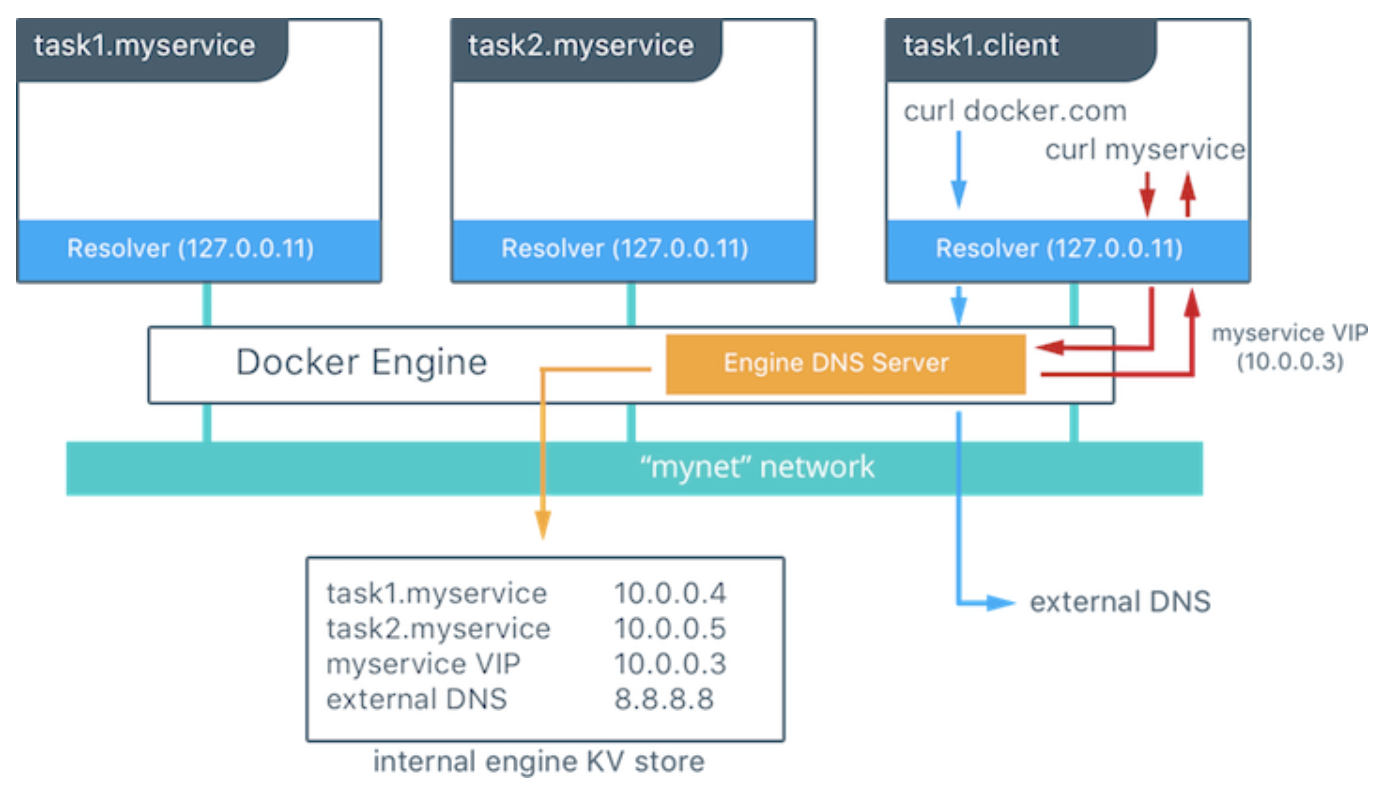Used to deploy a server/client that polls a list of endpoints, and also accepts polls from each of them. This leads to a "mesh" topology whereby each relies on a functioning overlay network, and its DNS service. All connections are logged to stderr as well as (optional) Graylog. This makes it trivial to spot when containers within an overlay network lose their ability to talk to each other.
There are lots of issues which have plagued Docker Swarm overlay networks, especially when using encryption - and this simply helps to pin-point where the issue lies. This issue is very hard to diagnose by looking at application logs from other containers. The diagram below shows how docker dns works (from: https://stackoverflow.com/questions/44724497/what-is-overlay-network-and-how-does-dns-resolution-work):
This code works by deploying a "pinger" service onto each node in the swarm, and each of these will discover the others of its kind (same stack) and start to attempt to:
- resolve the partner(s) address (this verifies dns)
- connect to each partner's http listener
once done, it will send a status log entry for each - showing either an error, or an ok. This means that within your logging solution (or just the service's logs) it is easy to see whether the underlying overlay network is experiencing issues. These issues include things such as:
- dns hangs
- connection attempts to known addresses fail
The only requirements are that you modify the ".env" and "docker-compose.yaml" files before deploying the stack into your swarm. Just follow the comments within the respective files.
docker stack deploy --compose-file docker-compose.yaml testpinger
gives:
<admin>$ docker stack deploy --compose-file docker-compose.yaml testpinger
Creating network testpinger_my-test-bridge
Creating service testpinger_pinger
view the service:
<admin>$docker service ps testpinger_pinger
ID NAME IMAGE NODE DESIRED STATE CURRENT STATE ERROR PORTS
lohmi5w7ypkf testpinger_pinger.1 nicgrobler/pinger:v1.0.0 docker-desktop Running Running 5 minutes ago
cppf5llddb7j testpinger_pinger.2 nicgrobler/pinger:v1.0.0 docker-desktop Running Running 5 minutes ago
i2j6tddgnke8 testpinger_pinger.3 nicgrobler/pinger:v1.0.0 docker-desktop Running Running 5 minutes ago
view logs:
<admin>$docker service logs -f testpinger_pinger
testpinger_pinger.1.lohmi5w7ypkf@docker-desktop | time="2020-02-27T15:58:49Z" level=info msg="logging to stderr only - no graylog url supplied"
testpinger_pinger.1.lohmi5w7ypkf@docker-desktop | time="2020-02-27T15:58:49Z" level=info msg="http listener on: 0.0.0.0:8111"
testpinger_pinger.1.lohmi5w7ypkf@docker-desktop | time="2020-02-27T15:58:49Z" level=info msg="starting clients..."
testpinger_pinger.3.i2j6tddgnke8@docker-desktop | time="2020-02-27T15:58:49Z" level=info msg="starting clients..."
testpinger_pinger.3.i2j6tddgnke8@docker-desktop | time="2020-02-27T15:58:49Z" level=info msg="logging to stderr only - no graylog url supplied"
testpinger_pinger.3.i2j6tddgnke8@docker-desktop | time="2020-02-27T15:58:49Z" level=info msg="http listener on: 0.0.0.0:8111"
testpinger_pinger.2.cppf5llddb7j@docker-desktop | time="2020-02-27T15:58:49Z" level=info msg="starting clients..."
testpinger_pinger.2.cppf5llddb7j@docker-desktop | time="2020-02-27T15:58:49Z" level=info msg="http listener on: 0.0.0.0:8111"
testpinger_pinger.2.cppf5llddb7j@docker-desktop | time="2020-02-27T15:58:49Z" level=info msg="logging to stderr only - no graylog url supplied"
testpinger_pinger.3.i2j6tddgnke8@docker-desktop | time="2020-02-27T15:58:59Z" level=info msg="ok:http://testpinger_pinger.2.cppf5llddb7j7asz2up0679li.testpinger_my-test-bridge:8111/ping - returned ok"
testpinger_pinger.2.cppf5llddb7j@docker-desktop | time="2020-02-27T15:58:59Z" level=info msg="ok:http://testpinger_pinger.1.lohmi5w7ypkfajvx1upsgk2o8.testpinger_my-test-bridge:8111/ping - returned ok"
testpinger_pinger.2.cppf5llddb7j@docker-desktop | time="2020-02-27T15:58:59Z" level=info msg="ok:http://testpinger_pinger.3.i2j6tddgnke8ag1mhbchwyvtq.testpinger_my-test-bridge:8111/ping - returned ok"
testpinger_pinger.1.lohmi5w7ypkf@docker-desktop | time="2020-02-27T15:58:59Z" level=info msg="ok:http://testpinger_pinger.3.i2j6tddgnke8ag1mhbchwyvtq.testpinger_my-test-bridge:8111/ping - returned ok"
testpinger_pinger.1.lohmi5w7ypkf@docker-desktop | time="2020-02-27T15:58:59Z" level=info msg="ok:http://testpinger_pinger.2.cppf5llddb7j7asz2up0679li.testpinger_my-test-bridge:8111/ping - returned ok"
testpinger_pinger.3.i2j6tddgnke8@docker-desktop | time="2020-02-27T15:59:09Z" level=info msg="ok:http://testpinger_pinger.1.lohmi5w7ypkfajvx1upsgk2o8.testpinger_my-test-bridge:8111/ping - returned ok"
testpinger_pinger.3.i2j6tddgnke8@docker-desktop | time="2020-02-27T15:59:09Z" level=info msg="ok:http://testpinger_pinger.2.cppf5llddb7j7asz2up0679li.testpinger_my-test-bridge:8111/ping - returned ok"
testpinger_pinger.2.cppf5llddb7j@docker-desktop | time="2020-02-27T15:59:09Z" level=info msg="ok:http://testpinger_pinger.3.i2j6tddgnke8ag1mhbchwyvtq.testpinger_my-test-bridge:8111/ping - returned ok"
testpinger_pinger.2.cppf5llddb7j@docker-desktop | time="2020-02-27T15:59:09Z" level=info msg="ok:http://testpinger_pinger.1.lohmi5w7ypkfajvx1upsgk2o8.testpinger_my-test-bridge:8111/ping - returned ok"
testpinger_pinger.1.lohmi5w7ypkf@docker-desktop | time="2020-02-27T15:59:09Z" level=info msg="ok:http://testpinger_pinger.3.i2j6tddgnke8ag1mhbchwyvtq.testpinger_my-test-bridge:8111/ping - returned ok"
testpinger_pinger.1.lohmi5w7ypkf@docker-desktop | time="2020-02-27T15:59:09Z" level=info msg="ok:http://testpinger_pinger.2.cppf5llddb7j7asz2up0679li.testpinger_my-test-bridge:8111/ping - returned ok"
<admin>$
finally, to stop:
<admin>$docker stack rm testpinger
Removing service testpinger_pinger
Removing network testpinger_my-test-bridge
The image (dockerhub) with versions > 3.0.0 contain an extra binary: composer This talks directly to the docker api, and creates the stack automatically - given the parameters in its own .env file, which is passed into the containers, and supercedes the one in this repo (it is a superset).
At runtime, the binary will create a stack-per-network - for each and every network of type "overlay", with the exception of the default "ingress" network. Each non-manager node (by default) will run a container-per-network, all of which talk to partnets in the same overlay network as its running in.
First step is to extract the pre-built binary from within the container (Linux x64 build):
$ docker run nicgrobler/pinger:latest &
$ docker ps
CONTAINER ID IMAGE COMMAND CREATED STATUS
e7f501f3b744 nicgrobler/pinger:latest "/go/bin/pinger" 11 seconds ago Up 11 seconds
$ docker cp e7f501f3b744:/go/bin/composer composer
The following shows how to run it:
$ ./composer
created server: test_stack_bubbles_pinger
created server: test_stack_bubbles_test_overlay_pinger
Then to verify:
$ docker stack ls
NAME SERVICES ORCHESTRATOR
test_stack_bubbles 1 Swarm
test_stack_bubbles_test_overlay 1 Swarm
From this stage, these function as any stacks deployed using "docker stack deploy..."
